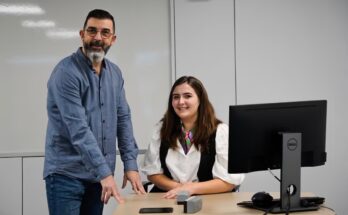Natalia Gamba (28) studied social communication in Colombia and “couldn’t wait” to launch her professional career as a journalist in Spain. Nothing could be further from the truth. He obtained a master’s degree and began an internship in a media publication, but from the first moment precariousness and indifference marked his experience. He did not receive any compensation, his functions were not defined and no one explained to him how to correct his mistakes: “Mentally it was very hard because they exploit us to the maximum for 200 euros and do not value our work as interns.” Lorenzo Berarte (29 years old), an Italian who also decided to opt for Spain to acquire more professional skills in his field, geological engineering, tells a story of “frustration”. After completing a six-month internship in a company in the sector, he firmly states that in his home country being an intern is better. “You learn a lot more,” he says. In Spain he reports that “they forced him to carry out more tasks than he should have” and that he did not feel valued.
These are just some of the stories that push the Ministry of Labor to promote scholarship status, a bill that aims to reverse the precariousness that continues to characterize the internships of many students in Spain. The Council of Ministers last week gave initial approval to the bill, almost two and a half years after the presentation of the agreement with the unions and which was rejected not only by business associations and university rectors. This did not please even the socialist part of the Executive, which stated that the agreed text lacks “technical work” and that it is “green”.
The text accepted by the PSOE has not undergone substantial changes compared to the one agreed with CC OO and UGT, only some technical modifications, according to the draft that this newspaper was able to consult. The project that Yolanda Díaz agreed with the workers’ representatives is based on three pillars: limiting extracurricular practices to a maximum of 480 hours, half of the current ones to prevent these scholarships that do not grant credits from continuing indefinitely; that companies and public institutions that host students are obliged to compensate the expenses of students on internships who do not receive a salary; and impose a sanctions regime that punishes non-compliance by up to 225,000 euros.
Natalia Gamba and Antón (27 years old) are also betting on the fines, as he prefers not to reveal his real name for fear of retaliation, given that he works in a company where he was an intern. And he assures that “if more sanctions are imposed, companies will certainly treat them better”. This energy engineer recalls that in the two companies related to this sector in which he did internships, they asked him to do things “that a qualified engineer or architect should do”. He had to evaluate the feasibility of land where solar panels could be installed, “something that should at least have the supervision of a tutor”.
Precarious internships are a phenomenon monitored by the Inspectorate, which without the current legislation does not yet translate into a large volume of sanctions. According to data provided by the ministry, in 2024 the control body carried out 802 interventions in this sense, which led to the conversion of 220 people into employees. They were “fake interns,” people who actually performed the duties of a member of staff they were part of. These conversions were accompanied by fines of 325,000 euros to the employers, who also paid 737,900 euros in contributions due.
The previous year, in 2023, there were 1,049 interventions which served to convert 138 scholarship holders into employees. These processes resulted in 325,000 euros in inspection sanctions and the request for 551,000 euros in social security contributions.
Mireia Oliván (35 years old) has just started her first university internship. I was supposed to do an internship at a public relations and communications agency in Barcelona, but it only lasted half a day. She claims to have felt “very frustrated” because when she arrived “she wasn’t even introduced to a tutor” and no one expected her arrival. Months later, she suffered another bad episode at a cosmetics company, where she was forced to “fill out paperwork to justify expenses,” which had nothing to do with her duties.
Difficulties in Parliament
This law, promoted by the ministry and the unions, has very little chance of getting enough green points on the Congressional billboard. The closing of the door by Junts, made official last week with a consultation with its bases and concluded on Thursday with the announcement that they will no longer approve government laws, closes the road to the investiture of the majority.
Once these two avenues are closed, the scholarship holder’s status remains unchanged. Even if by a twist of fate Junts’ position changed, the Executive would still not be guaranteed the initiative’s success. When asked by this newspaper, the PNV specifies that it does not yet have a position on the matter. But in 2023, when the agreement was reached with the unions, they expressed the following: “It was not discussed with us, much less agreed. Nor was it agreed with the universities or the autonomous communities.”
The ERC also spoke out against it. Now, sources from the Catalan group insist on the importance of forcing companies to pay for internships, an option that is not contemplated in the current project and which the ERC criticizes. However, they invite dialogue with the Ministry on this project and underline that they have already made progress in some aspects. Bildu and Podemos, consulted by this newspaper, did not specify their position.
The unions ask the parties for support
The unions hope to convince these parties to support the project. Belén Guirao, general secretary of the UGT youth association (RUGE), indicates that during the negotiation phase (three years ago) it seemed that the parties were in favor of the measure: “The PP also told us that they were in favor, that they thought it was a fundamental text, which would have meant a big step forward. We will try to convince them again. We don’t understand why they say one thing in public and another in private.” CC OO Youth Secretary Pau Garcia says they will meet again with parliamentary groups with the same goal: “Despite what Junts said, we want them to listen to us. And we want PSOE and Sumar to fight for this project in Congress.”
Unions estimate that the bill will return to the Council of Ministers for a second reading in about six months, the step before it enters Congress. The last bill that the Government brought to Parliament concerned the reduction of working hours, which did not even manage to pass the amendment process.
Gamba recognizes that she did not have a good experience as an intern and therefore, she assures, “something must change” so that those who do internships in companies in the future are “treated with dignity” and specifies: “We cannot yet be at the point where interns are exploited, which is why this figure must be better regulated”.



